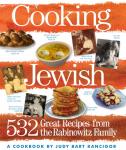
BUY COOKING JEWISH by clicking here now.
Hanukkah's Heart
Hanukkah's heart
A family's treasured recipes and rich history meld in a self-published cookbook
December 17, 2000
By CATHY THOMAS
The Orange County Register
The first edition of Judy Bart Kancigor's "Melting Pot Memories" sold out in six weeks in spring 1999. Since then, three more editions have been printed, with a total of more than 2,400 copies sold. There hasn't been any fancy merchandising campaign, simply word of mouth.
At first, she was surprised by brisk sales of her self-published cookbook. I'm not.
Recently, I visited her Fullerton home, seeking Hanukkah recipes. Delectable dishes to celebrate the eight-day Jewish festival commemorating the rededication of the Temple, the feast of lights that celebrates the small cruse of oil that lighted the Temple's holy lamps for eight days. (This year, Hanukkah begins Dec. 22).
Kancigor shared holiday dishes such as Aunt Hilda's Cherry Chili Chicken, a savory-sweet roast chicken dish with raisins and pitted black cherries (most probably from the '40s), and her incredible potato latkes, with an updated, reduced-fat option.
I got formulas for those mouthwatering specialties, but Kancigor and her captivating book left me with so much more than recipes from relatives.
She has captured the joy, wisdom and nostalgic history of the Rabinowitz family, tracing her grandparents' roots from Slonim (a city in Eastern Europe that is now part of Belarus, formerly Russia and before that, Poland) to suburbia.
Among the recipes, she weaves stories of Ellis Island in the early 1900s, the Great Depression and World War II, as well as recollections of her father, Jan Bart. Bart, a cantor and entertainer in early television, at the time of his death in 1971 had raised more funds for Israeli bonds than had any other performer.
There aren't any food photos, just portraits. Sepia-toned photos of the Rabinowitz family: grandparents, parents, children and grandchildren. Aunts, uncles and cousins.
But why would anyone want to read a book about someone else's family? Why does this first-time author's book intrigue cooks and noncooks alike?
I think it's because these heartwarming pages strike at the core of a family's courage, humor and pride. Stories about tradition and togetherness. Love as well as food.
The most common response that Kancigor hears from readers is regret over not having documented their own family stories and recipes.
"I didn't set out to write a cookbook," said Kancigor, mother of two and grandmother of three. "The cousins had gathered together in 1996, when my Aunt Estelle was dying. It occurred to me that we were losing one generation at the same time I was waiting for my first grandchild to be born. The next generation wouldn't know any of our history. Wouldn't know our food.
"I thought about our family recipes, and how they needed to be saved," she recalled, remembering the food-splattered pages of her Aunt Estelle's handwritten recipes. Her aunt's son brought the recipe-filled, well-worn black and white notebook to the hospital. Her aunt pointed out the recipes she thought should be included in the cookbook, which at that point was thought of exclusively as a "for family only" publication.
Kancigor turned to her cousins, asking for more recipes as well as photos, old clippings and remembrances. Soon, anyone related by blood or marriage was contributing to the book; 600 recipes from 156 relatives. In-laws of in-laws are considered part of the family, the extended family called mishpuchah in Yiddish.
She writes that mishpuchah is so much more than the English word for "family.''
"It includes cousins (all degrees) and in-laws (even their cousins and in-laws) and of course, machatunim, a word meaning your children's inlaws," she wrote.
And like most families, many of the Rabinowitz mishpuchah's culinary memories focus on religious holidays.
"Lighting the candles, I am transported to the Hanukkahs of my youth," she writes in her introduction to her potato latkes recipe, a favorite she says is the essential Hanukkah dish, because latkes (potato pancakes deep-fried in oil) represent the miracle of the small amount of oil that lasted eight days.
"For the Rabinowitz cousins, raised together as practically siblings, our childhood was the New York version of the movie Avalon (without the fire). ... There were so many of us that (grandfather) Papa Harry put a board on the children's table," she wrote.
"The highlight was the Hanukkah party. The piles of latkes! The mountains of presents! The noise! The excitement! The squabbles . ... "
But I imagine that table quieted down when those luscious latkes were served. Kancigor's latkes look like crispy-brown snowflakes. These lacy, almost-crunchy wonders are served either with applesauce or a dipping sauce made with a reduction of the pan juices from the Aunt Hilda's Cherry Chili Chicken, a Hanukkah entree.
Later, she said, after the Kancigor sons were born and the family moved to Fullerton (1972), her latkes became part of the Orange County neighborhood's holiday tradition.
"When my boys were growing up, every Hanukkah, I would make latkes by the hundreds, decorate platefuls, and they would take them to our non-Jewish neighbors," said Kancigor, a former English teacher and court reporter. "It became a tradition that the neighbors really looked forward to.
"I'm still in contact with our (former) next-door neighbors who have since moved to Oregon; they always said how they missed them. When I sent them my cookbook, the mom was thrilled that now she can make them herself."
The taste and smell of family recipes can bring back many memories. Thus was the case when Kancigor first tested her grandmother's recipe for Maple Walnut Cake. Her mother, Lillian Bart of Placentia, her "sous-chef and right arm," was on hand to help with the tasting.
"When I took the cake out of the oven, my mother tasted it and her mouth fell open," she said. "Tears welled up in her eyes as she explained that it was exactly like her mother's cake."
Mama Hinda's Maple Walnut Cake for Hanukkah, along with nostalgic chicken and heavenly latkes on the side.
Generations of treasured food memories forever bequeathed in a cookbook full of stories.
Cathy Thomas is the Register's food editor. She can be reached at (714) 796-7770 or by e-mail at cthomas@notes.freedom.com.

